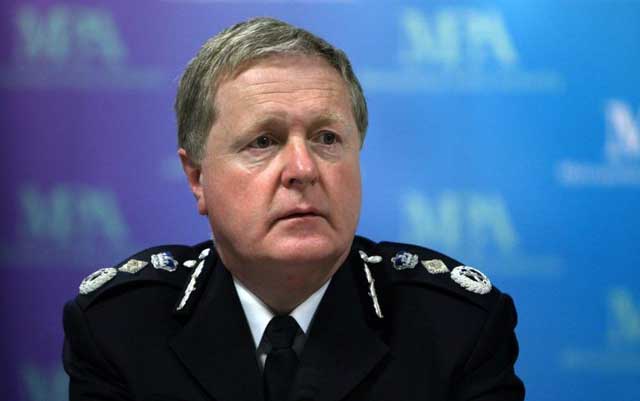Accusations of Met cover-up put more heat on Ian Blair
Whistleblowers accuse police of turning a blind eye to reports that murdered special constable was running an escort agency

Your support helps us to tell the story
From reproductive rights to climate change to Big Tech, The Independent is on the ground when the story is developing. Whether it's investigating the financials of Elon Musk's pro-Trump PAC or producing our latest documentary, 'The A Word', which shines a light on the American women fighting for reproductive rights, we know how important it is to parse out the facts from the messaging.
At such a critical moment in US history, we need reporters on the ground. Your donation allows us to keep sending journalists to speak to both sides of the story.
The Independent is trusted by Americans across the entire political spectrum. And unlike many other quality news outlets, we choose not to lock Americans out of our reporting and analysis with paywalls. We believe quality journalism should be available to everyone, paid for by those who can afford it.
Your support makes all the difference.Sir Ian Blair faces a new investigation after whistleblowers accused the already embattled Metropolitan Police Commissioner of turning "a blind eye" to corruption allegations surrounding murdered Special Constable Nisha Patel-Nasri.
It has emerged that in 2003, three years before her husband plotted the murder, the Met had been alerted to a possible corrupt association between the couple and a senior officer.
The tip-off came from a police sergeant in another force who sent three detailed reports to the anti-corruption unit, which was then under Sir Ian's command.
One report warned that the couple were running a prostitution racket and had boasted of having protection high up in the police.
An IoS investigation can reveal that a senior officer based at Scotland Yard was named in the second report. It said he had provided confidential information about a client of the couple's escort agency, Seventh Heaven, who owed money.
However, the claims were not investigated. And lawyers for Fadi Nasri, who was convicted of his wife's murder in May, say that anti-corruption detectives never questioned him.
Now, a whistleblower who worked on the murder inquiry claims she was told not to research the corruption allegations. Tracy Clarke, a former Met intelligence researcher, says she raised the matter with senior officers because of concerns that Nasri, who was arrested nine months after the murder, might use the police contact to compromise the inquiry. "We already knew that we had a leak," she said on Friday.
In July, Ms Clarke made a formal complaint to London Mayor Boris Johnson and the Metropolitan Police Authority (MPA). In her complaint, she asked the watchdog: "What happened to the senior officer? I would suggest absolutely nothing. While vast sums of money are spent on justifying the existence of the anti-corruption command this is just one more piece of evidence where a blind eye is turned, rather than have the Metropolitan Police Service discredited."
On Friday, an MPA spokesperson confirmed it has asked the Met's anti-corruption unit "to satisfy the authority that the investigation was carried out to the highest standards and that no lines of inquiry were left unexplored".
Sir Ian is already under investigation by the watchdog following allegations of improper links with a businessman who was awarded Met contracts.
These disclosures come as war broke out between Sir Ian and Assistant Commissioner Tarique Ghaffur, who is bringing an action for race discrimination.
The Met told the IoS it never received the second report naming any senior officer. However, Dave Eden, the Hertfordshire police sergeant who wrote it, denied this. He said: "I am happy to co-operate with any inquiry."
Sgt Eden's reports relate to a 999 call he had just attended. A client of the escort agency was disputing a bill and Patel-Nasri, her husband and two others had gone to his home in Elstree to recover the money.
The first document was an intelligence report in which Sgt Eden complained that Patel-Nasri had misused her warrant card and aggressively told him that her "powerful friends at Scotland Yard" would get him the sack.
Separately, Sgt Eden wrote a report of the incident and his subsequent actions. Fadi Nasri had given him the name of the senior Scotland Yard officer who he claimed had provided confidential information about the client. The next day, Sgt Eden contacted him. When he explained the purpose of the call and mentioned Nasri's name, the officer hung up.
The third document was a witness statement he had taken from the client.
All three documents were created on a police computer 24 hours after the incident. Sgt Eden sent printed copies of the three documents to the anti-corruption unit at Scotland Yard, to Wembley police station, where Patel-Nasri worked, and to Hertfordshire Police's professional standards department.
The Met will only accept that it received Sgt Eden's intelligence report on Patel-Nasri, who was subsequently disciplined for misusing her warrant card to enforce a civil debt.
Inexplicably, the Met's anti-corruption unit never debriefed Sgt Eden. And had he not made contact with the murder squad three years later, says Ms Clarke, detectives would not have known about the escort agency or any link with a senior Met officer.
It was Ms Clarke's job to research Sgt Eden's statement for the murder inquiry. She could not access any of the Met's anti-corruption files. "I felt the murder inquiry was warned off from pursuing Eden's statement because it would take the Met down a corruption route it had covered up," she said.
Join our commenting forum
Join thought-provoking conversations, follow other Independent readers and see their replies
Comments